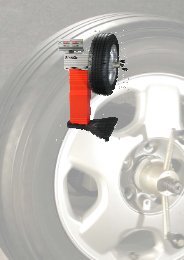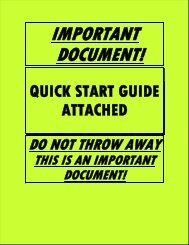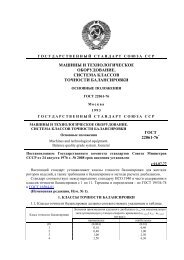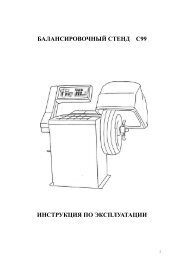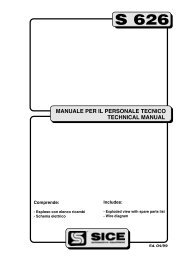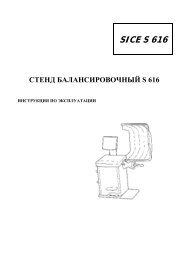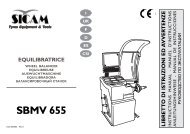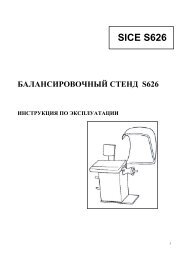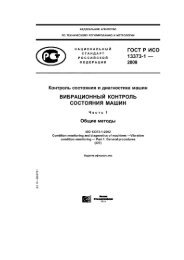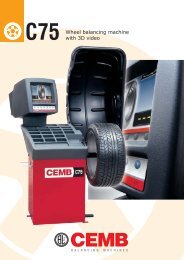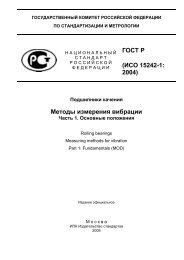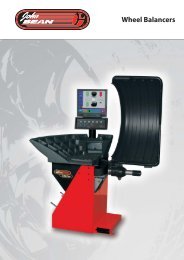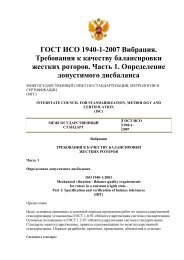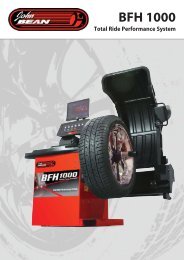Garrett Catalog - RB Racing
Garrett Catalog - RB Racing
Garrett Catalog - RB Racing
Create successful ePaper yourself
Turn your PDF publications into a flip-book with our unique Google optimized e-Paper software.
<strong>Garrett</strong> ®<br />
by Honeywell<br />
Turbo Selection -Diesel<br />
Today’s diesel engines represent the state of the art in technology<br />
with high power density, excellent drivability, and good fuel<br />
economy. Fortunately for the diesel enthusiast, they are easier<br />
to upgrade for additional performance and the aftermarket is<br />
responding with more options for your high performance needs.<br />
As the major air system component, the turbocharger is a vital part<br />
of the performance equation and choosing the right turbo is critical<br />
to meeting your performance targets.<br />
So why would I want to upgrade my Turbo Diesel engine?<br />
Better towing performance -- Maybe you bought your truck to tow<br />
that gooseneck for work, to get your 5th wheel to the next resort or<br />
your boat to the lake. It sure would be nice to get up to freeway<br />
speeds quickly and maintain highway speeds in hilly terrain. With<br />
the right upgrades, that can be done safely and efficiently.<br />
power target. Since turbochargers are sized by how much air they<br />
can deliver and airflow is proportional to engine power, a realistic<br />
horsepower goal is critical to make the right choice.<br />
The concept of a realistic goal needs to be stressed in order to<br />
ensure maximum performance and satisfaction. Sure, everyone<br />
would like to have a mega-horsepower vehicle but past a reasonable<br />
limit, as the power goes up, the reliability, drivability and day-to-day<br />
utility is diminished. Things are more likely to go wrong, wear out<br />
and break down as the power output climbs.<br />
Most project vehicles fall into one of the following general<br />
categories:<br />
Great, So what turbo do I choose?<br />
Competition Use -- More and more enthusiasts are interested in<br />
heavily modifying their vehicles for competition use. Some are<br />
weekend warriors that use their vehicles during the week for routine<br />
duty then go to the track on the weekends while others are building<br />
strictly race vehicles that give up streetability for the demands of<br />
the track.<br />
More fun -- For many, making modifications for increased<br />
performance is a way of personalizing the vehicle and to have a<br />
bit more fun with the daily drive. There is a satisfaction that comes<br />
from modifications that put you back into your seat a little harder<br />
when the light turns green. And, there are always the grudge<br />
matches at the local drag strip.<br />
What do I need to know to choose the right diesel upgrade<br />
turbocharger?<br />
The amount of power that a diesel engine makes is directly<br />
proportional to the amount of fuel injected into the cylinder and that<br />
fuel needs sufficient air for complete combustion. For smoke-free<br />
performance, the engine needs about 18 times more air (by mass)<br />
than fuel. So clearly, as more fuel is added, additional air needs<br />
to be added also. In most applications, the stock turbo has some<br />
additional capacity for increased power, but as the compressor<br />
reaches the choke limit (maximum flow), the turbo speed increases<br />
rapidly, the efficiency drops dramatically, and the compressor<br />
discharge temperature ramps up very quickly. This creates a<br />
“snowball” effect in that the higher discharge temps mean higher<br />
intake manifold temps and higher exhaust gas temps. The lower<br />
efficiency means that more turbine power is required to reach the<br />
same boost causing higher back pressure in the exhaust manifold.<br />
This can usually be seen on an engine with a performance chip<br />
(at the highest power setting) and maybe an intake or exhaust<br />
upgrade. Under heavy acceleration, smoke is pouring from the<br />
tailpipe as the EGT’s and turbo speeds are climbing into the danger<br />
zone requiring a prudent driver to back off the accelerator pedal<br />
early to keep from damaging the engine. Under these conditions,<br />
the stock turbo is running on borrowed time. With an upgrade<br />
turbocharger selected to compliment the extra fuel, smoke is<br />
drastically reduced, EGT’s are under control and, since the turbo<br />
is operating in a more efficient range, horsepower and drivability<br />
are enhanced. When the modifications get more serious, a bigger<br />
turbo is a must-have to compliment even more fuel.<br />
In order to decide on the appropriate turbocharger for your diesel<br />
engine, the very first thing that needs to be established is the<br />
Let’s take each case and calculate a turbo choice based on the<br />
intended power increase. The first step is to read the catalog<br />
section “Turbo Selection - Gasoline” (pages 8-11). This article<br />
explains the reading of a compressor map and the equations<br />
needed to properly match a turbo. The examples given, however,<br />
are for gasoline engines, so the additional examples here will be<br />
using those same equations but with a diesel engine. Matches<br />
will be calculated with an Air Fuel Ratio (AFR) of 22:1 for low or<br />
no smoke performance. Likewise a typical Brake Specific Fuel<br />
Consumption (BSFC) is in the range of 0.38. Let’s get started!<br />
The first example will be for the Daily Driver/Work Truck/Tow<br />
Vehicle category. This includes vehicles up to 150HP over stock.<br />
But wait, this power level can be accomplished with just a chip or<br />
tuning module. So why bother with a new upgrade turbo? An upgrade<br />
turbo will enhance the gains made by installing the chip and<br />
other upgrades. The extra air and lower backpressure provided<br />
by the upgrade turbo will lower EGTs, allow more power with less<br />
smoke and address durability issues with the stock turbo at higher<br />
boost pressures and power levels. Because this will be a mild<br />
upgrade, boost response and drivability will be improved across<br />
the board.<br />
EXAMPLE:<br />
I have a 6.6L diesel engine that makes a claimed 325 flywheel<br />
horsepower (about 275 wheel Horsepower as measured on a<br />
chassis dyno). I would like to make 425 wheel HP; an increase of<br />
150 wheel horsepower. Plugging these numbers into the formula<br />
and using the AFR and BSFC data from above:<br />
Honeywell<br />
www.TurboBy<strong>Garrett</strong>.com<br />
13



